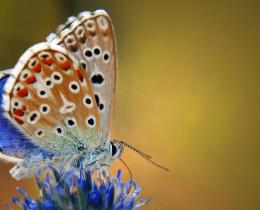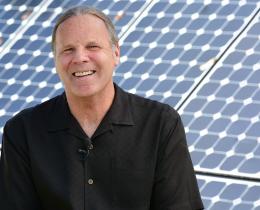Omega: What do you mean by the phrase "ecological consciousness"?
Andrew: Ecological consciousness is the connection between human beings and the larger earth entity. We have a unique capacity in the human species to tune into the consciousness of the earth, to know in a sense what the earth itself wants.
Ecological consciousness is also the awareness of who we are, both as individuals and collectively, as an organism. I call it tuning in deeply to our biological heritage.
Omega: What are some simple ways that people can connect to the place where they live?
Andrew: In our own interior space we can create a little haven. On a rooftop we can create windbreaks that attract pollinators and songbirds. In doing that we can have privacy; we can have beauty; we can look at the sky; we can have green leaves—all things that are biologically programmed into us to want.
One thing that is very valuable is finding simple means by which you can connect with something that grounds you. You can pay attention to where the sun rises and sets. You can find a nearby park to go to in the morning.
Omega: What can people do to start transforming our culture into one that is more sustainable?
Andrew: Permaculture is about intelligently positioning your strategy of living so that you’re participating incrementally and realistically in the change you want to see.
The most accessible way for people to participate in this type of change is to first learn about the food they eat. If they’re eating cheese, or a steak, think about what was the life of the animal? Was it a life where the animal was able to live outside in its natural habitat, expressing all of its emotional characteristics, able to breed in a natural way? Or if it's a tomato, was it a tomato that was grown in healthy soil?
When you’re living the sacred act of imbibing food, you want the ability to go on a sort of imaginary journey where you can become one with the plant you’re ingesting. Whether you're a vegetarian, a vegan, or an omnivore, you are ingesting living organisms. Those living organisms are going to have a significant role in your overall well-being.
Omega: You use the phrase "retrofitting industrial civilization" to talk about the bigger sorts of changes that we need to make. What do you mean by this?
Andrew: Industrialization has added a huge, unnecessary, pollution load. That pollution load is in the diesel emissions of the tractor trailers and the fossil fuel infrastructure. Ultimately, this is making places like New York City, Philadelphia, and Boston unable to be in compliance with the Clean Air Act.
Cities have this inherent attraction because of the human element in them, but then it’s as if people just put up with how bad the air is, how bad the water is, and how little vegetation there is.
Could we retool things so we’re not inherently hurting ourselves by turning on our lightbulb at night? Can we have the basic necessities of life without a legacy that is unacceptable because of these emissions into our environment? What could be changed to make cities places that actually were enjoyable for people to live in? We need to recognize that an industrial way of meeting all of our needs is actually an ill-suited solution.
Omega: How do you think we rectify this situation?
Andrew: There’s a population in the northeastern United States—especially in Williamsburg, Brooklyn and in the Hudson Valley—that is starting to move in the direction of being more regionally self-reliant.
People are saying, “What if not just our food comes from within a regional distance, but what if what we build our buildings with materials from not so far away? What if the medicines we take are grown wild, in healthy soil? What about making all of our clothing from plants that are actually wild and weedy and considered an exotic invasive? That could also be where our paper is manufactured.”
It’s about what things are made out of, where the power comes from, and who is producing the things that we’re consuming. By becoming more local producers, we reclaim autonomy.
We can’t sit on our hands and ask corporate America and the Federal government to save our day. We need to lean on ourselves and become entrepreneurs. That’s the key to what will ultimately create real security in this country. So long as we’re held hostage to long distance transportation of energy, and to the basic necessities of life, then we don’t have real security.
Our supply lines are our weak point, just as they were the weak point in the Roman Empire, just as they were in the British Empire. We’re simply repeating a pattern of civilization design that is inevitably going to lead to failure.
Does it make sense to have strategies of tragedy, where we attempt to keep alive a dying beast that shouldn’t be what we ultimately depend on at all? Or do we create a whole new economy in the midst of that obsolete economy, one that has the real resilience that we’re looking for?



